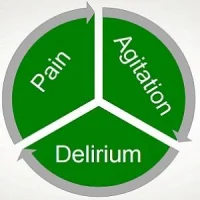While the Apgar score assesses a baby's condition at birth, this metric may also be a useful tool for predicting whether a mother will become critically ill. Based on a new study published in JAMA Pediatrics, mothers whose babies had a low Apgar score had a nine-time higher risk of ICU admission than those whose baby had a normal Apgar. In addition, mothers who required mechanical ventilation in the ICU — indicating they were especially ill — were 18 times more likely to have had a baby with a low Apgar score.
The Apgar score is a universal measure done by physicians, midwives and nurses. It is obtained at one minute after birth and again at five minutes. It was designed to quickly evaluate a newborn's condition to determine if the baby needs immediate medical or emergency care. Interestingly, results of the new study show a "very strong relation" between a baby's Apgar score and whether its mother was admitted to ICU after delivery.
Dr. Joel Ray, a physician and researcher at St. Michael's Hospital in Toronto, and colleagues examined health records held by the Institute for Clinical Evaluative Sciences of more than 600,000 live births in Ontario between 2006 and 2012. They found that among mothers whose baby had a normal Apgar score five minutes after birth, 1.7 per 1,000 of the women were admitted to an ICU.
When the Apgar score fell into the intermediate range, 12.3 of every 1,000 mothers were admitted to an ICU. When the newborn's Apgar score was in the low range, the mother's rate of ICU admission rose to 18.2 per 1,000.
The 10-point Apgar scoring system awards two points each for Appearance (skin colour), Pulse (heart rate), Grimace response (reflexes), Activity (muscle tone), and Respiration (breathing rate and effort) of the newborn. A normal score is considered to be 7 or higher. An intermediate score is 4 to 6 and a low score is 0 to 3.
The correlation between a baby's Apgar score and its mother's risk of becoming critically ill was observed even upon taking into account the mother's age, number of previous deliveries, economic status and whether she had certain chronic health conditions. Mothers whose baby had an intermediate Apgar score had a 6.5-times higher risk of going to an ICU than those who had a normal Apgar.
A small proportion of women have a planned admission to ICU, not because they are critically ill, but for special monitoring of things such as a pre-existing heart condition. Most maternal ICU admissions are unplanned, for complications such as heavy bleeding after delivery, serious pre-eclampsia (high blood pressure) or following an emergency hysterectomy.
"Our study shows that a universally available metric for newborns — the Apgar score — provides a promising and novel application for mothers as well," Dr. Ray points out. "At a minimum, it confirms that, even after birth, the health of the baby and mother remain intimately linked."
Source and image credit: St Michael's Hospital
The Apgar score is a universal measure done by physicians, midwives and nurses. It is obtained at one minute after birth and again at five minutes. It was designed to quickly evaluate a newborn's condition to determine if the baby needs immediate medical or emergency care. Interestingly, results of the new study show a "very strong relation" between a baby's Apgar score and whether its mother was admitted to ICU after delivery.
Dr. Joel Ray, a physician and researcher at St. Michael's Hospital in Toronto, and colleagues examined health records held by the Institute for Clinical Evaluative Sciences of more than 600,000 live births in Ontario between 2006 and 2012. They found that among mothers whose baby had a normal Apgar score five minutes after birth, 1.7 per 1,000 of the women were admitted to an ICU.
When the Apgar score fell into the intermediate range, 12.3 of every 1,000 mothers were admitted to an ICU. When the newborn's Apgar score was in the low range, the mother's rate of ICU admission rose to 18.2 per 1,000.
The 10-point Apgar scoring system awards two points each for Appearance (skin colour), Pulse (heart rate), Grimace response (reflexes), Activity (muscle tone), and Respiration (breathing rate and effort) of the newborn. A normal score is considered to be 7 or higher. An intermediate score is 4 to 6 and a low score is 0 to 3.
The correlation between a baby's Apgar score and its mother's risk of becoming critically ill was observed even upon taking into account the mother's age, number of previous deliveries, economic status and whether she had certain chronic health conditions. Mothers whose baby had an intermediate Apgar score had a 6.5-times higher risk of going to an ICU than those who had a normal Apgar.
A small proportion of women have a planned admission to ICU, not because they are critically ill, but for special monitoring of things such as a pre-existing heart condition. Most maternal ICU admissions are unplanned, for complications such as heavy bleeding after delivery, serious pre-eclampsia (high blood pressure) or following an emergency hysterectomy.
"Our study shows that a universally available metric for newborns — the Apgar score — provides a promising and novel application for mothers as well," Dr. Ray points out. "At a minimum, it confirms that, even after birth, the health of the baby and mother remain intimately linked."
Source and image credit: St Michael's Hospital
References:
Ray JG, Medcalf KE, Park AL (2015) Association of Newborn Apgar ScoreWith Maternal Admission to the Intensive Care Unit. JAMA Pediatr.
Published online November 02, 2015. DOI:
10.1001/jamapediatrics.2015.3035
Latest Articles
healthmanagement, Apgar score, babies, critical illness, ICU, mechanical ventilation
While the Apgar score assesses a baby's condition at birth, this metric may also be a useful tool for predicting whether a mother will become critically ill, according to a new study published in JAMA Pediatrics.










